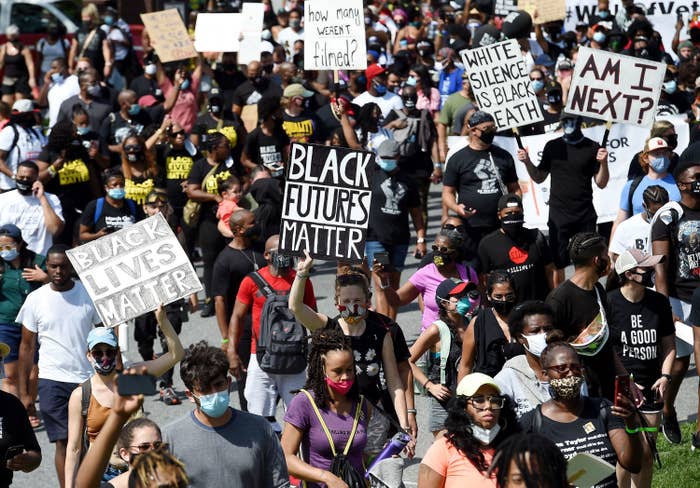
Young Latinos are being pushed to vote in the upcoming election by the protests that have gripped the country throughout the summer over the fight for racial justice, according to new data from a national survey of Latino voters between the ages of 18 and 34.
The survey, conducted by Telemundo and BuzzFeed News earlier this summer, also found that young Latinos are motivated by the coronavirus pandemic's outsize influence on their community.
The country’s renewed push for racial justice after the police killings of George Floyd and Breonna Taylor, the effects of the pandemic, and immigration reform have pushed young Latino voters to become engaged in the upcoming election, according to the survey.
The protests that have taken place across the country have become a focal point of the presidential race. The Republican National Convention heavily featured segments against widespread demonstrations and in favor of “law and order,” including an address from a Missouri couple who had been charged with unlawful use of a weapon after aiming guns at a group of protesters in their neighborhood. President Donald Trump and Democratic presidential nominee Joe Biden both visited Kenosha, Wisconsin, last week after protests erupted following the police shooting of Jacob Blake.
According to the survey, 55.8% of young Latino voters said they’d actively participated in racial equality or Black Lives Matter movements by protesting or boycotting, and half of young Latino people said protests across the country have motivated them to vote in the upcoming election. “Racial and ethnic social equality” motivates 62.7% of young Latino voters, according to the survey and 57% said reducing police brutality has pushed them to turn out for the election.
“Racial and ethnic social equality” was identified as the most important social or political issue for their generation by a majority of the Latino voters, with 16.6% identifying it as the top overall issue.
The coronavirus pandemic has exposed racial inequities in how communities across the country are affected by its consequences, and it’s motivating Latino voters ahead of the general election. Just 24.6% of young Latino voters “somewhat or strongly approve” of the president’s response to the pandemic, compared to 35.6% of young non-Latino voters.
In the survey, 41.1% of Latino voters indicated that the pandemic has strongly motivated them to vote in the upcoming election. Part of that motivation comes from their own experiences: 13% of Latino voters said they have worked in a high-risk job without enough protection over the course of the pandemic, compared to 11.3% of non-Latino voters. And 12.5% of Latino people said that they had lost their job because of the coronavirus, compared to 10.3% of young non-Latino people.
The upcoming election has created conflicting feelings for many young Latino voters, with wide support for Biden matching a belief that Trump will ultimately win. The survey found that 53% of young Latino Biden supporters believe he’ll win the election, compared to the 52% of young Latino Trump supporters who believe that Trump will win.
While 60% of young Latino voters say they are supporting Biden’s campaign, recent polling has shown the former vice president lagging behind with Latinos overall compared to where Hillary Clinton was in 2016. A recent poll from Equis Research, which surveyed 1,081 Latinos in Florida, found that while Biden led Trump 53% to 37% among Latino voters, Biden was still behind where Clinton performed, according to 2016 exit polling from CNN.
Despite the Biden campaign’s lagging performance among Latino voters in Florida compared to Clinton’s 2016 performance, 75.3% of young Latino voters surveyed in the Telemundo–BuzzFeed News poll indicated that they believe it is more important to vote in this election than the 2016 election.
The survey questioned 638 people who identified as Latino and 685 non-Latino people between the ages of 18 and 34. It was conducted from June 5 to June 22.
